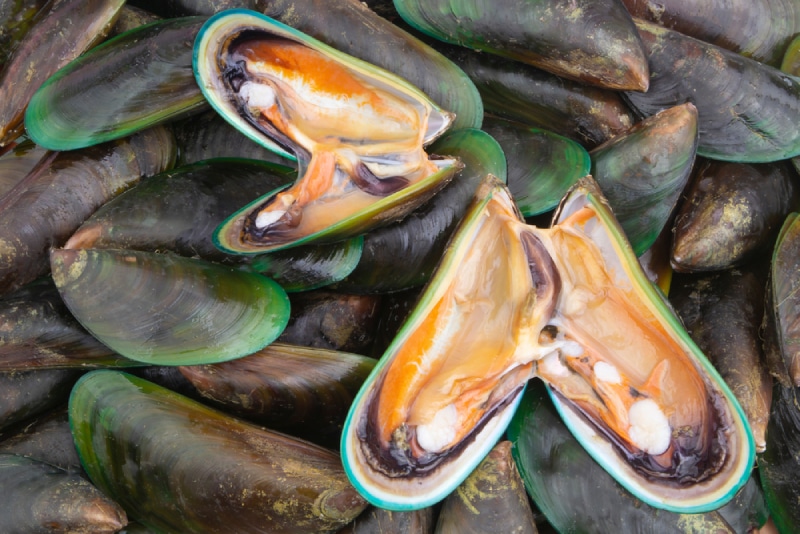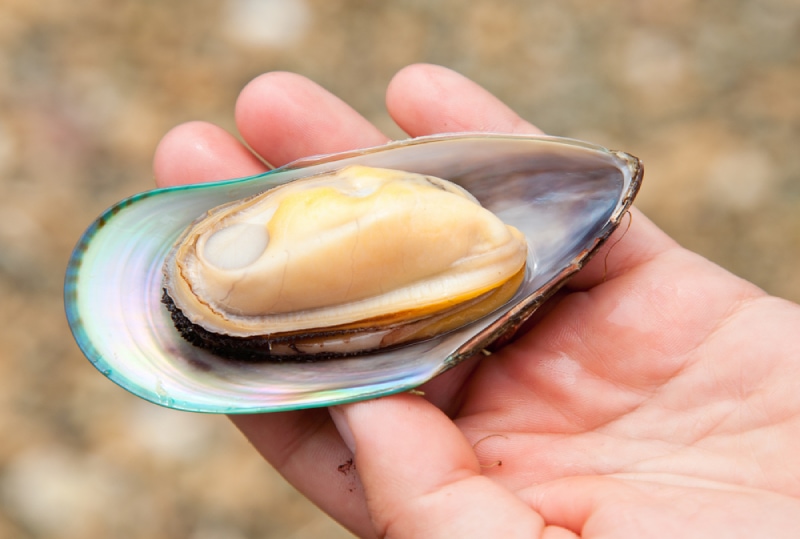Green Lipped Mussel for Cats: Vet Approved Pros, Cons & Benefits
Updated on

Green-lipped mussels (GLMs) are shellfish native to New Zealand. They’re commonly eaten in their home country and used in supplements as they may contain nutrients that can decrease swelling or inflammation.
The folks in New Zealand use the mussels for many ailments, including asthma, arthritis, attention deficit hyperactivity disorder, among others. Though there isn’t much scientific evidence supporting the claims that the mussels can help treat said issues, pet food manufacturers have begun implementing this shellfish into their recipes. Pet supplement manufacturers sell powdered or capsule forms of the mussels, too.
Read on to learn more about what green-lipped mussels are said to do for your cat and whether research says they’re a useful supplement or not.
What Are Green-Lipped Mussels?
Green-lipped mussels are an ingredient in some nutritional supplements derived from shellfish native to New Zealand. The mussels are said to have an anti-inflammatory and joint-protecting effect.
Green-lipped mussels contain eicosapentaenoic acid (EPA) and docosahexaenoic acid (DHA), omega-3 fatty acids only found in cold water fish, like salmon. These fatty acids are necessary for body systems, including your cat’s skin and coat, cognition, and the immune system.
There isn’t much information on how green-lipped mussels work, but its high omega-3 fatty acid content may have something to do with it. Extensive research has proven that omega-3s have anti-inflammatory action and may help promote locomotion in cats with osteoarthritis.
Green-lipped mussels also contain the important joint health components glucosamine and chondroitin, as well as antioxidants, to help maintain and repair joints as well.

How Are Green-Lipped Mussels Given?
GLMs can be given in many ways.
The easiest way to provide your kitty with a dose of this purported superfood is by choosing cat foods or treats containing GLM as an ingredient. There are a few pet food manufacturers that are known for the inclusion of the shellfish in their recipes. ZiwiPeak is perhaps the best-known company that includes green mussels and other superfoods like cold-washed green tripe and organic kelp in their formulas. Another popular option is The New Zealand Natural Pet Food Co.
Green-lipped mussels are also available in powdered formats. This might be a better option for cat owners who don’t want to switch their pets to a new food entirely. The powder can be sprinkled onto your cat’s existing food.
Capsules containing GLM are another option. You can pull the capsules apart and sprinkle the powder onto your pet’s food. Some manufacturers formulate green-lipped mussel oil into capsules you can give to your cat.
What Happens If You Miss a Dose?
If you forget to put the green-lipped mussel powder on your cat’s food, give it when you remember. However, if it is close to your pet’s next feeding, skip the dose you missed and give it at the next scheduled time. Return to your regular dosing schedule. You shouldn’t ever give your cat double doses at one time.
Potential Side Effects of Green-Lipped Mussel
There aren’t many studies on this supplement currently; therefore, information regarding side effects is limited.
Some cats may experience a brief worsening of arthritis signs after beginning to use this supplement. Some may also experience indigestion or flatulence, though the likelihood of this occurring can be minimized by ensuring the powdered variety is consumed alongside your pet’s meal.
The supplement may interact with other medications your pet is on, so check for any contraindications before giving it to your cat. Do not offer this supplementation if pregnant or nursing cats or those with certain diseases like heart or kidney failure.
Also, it probably goes without saying, but cats with seafood or shellfish allergies should not consume green-lipped mussel products.
As with anything, you must follow the instructions on the label of your supplement and the advice of your veterinarian.
Frequently Asked Questions (FAQs)
What does science say about green-lipped mussels for cats?
Further research needs to be done to fully determine if green-lipped mussels are beneficial to cats. Right now, we have to rely on these few scales studies including:
A study from 2022 looked at the combination effect of green-lipped mussels, curcumin, and black currant leaf extract in treating dogs and cats with osteoarthritis. The results showed that cats could groom themselves better, play more, and walk up the stairs more easily when given the supplement as opposed to the placebo group.
A study from 2010 looked specifically at cats with feline degenerative joint disease (DJD) as no approved therapies for alleviating DJD-associated pains existed at the time. Researchers provided test subjects with a diet high in omega-3 fatty acids. They supplemented it with green-lipped mussel extract to see if the combination affected pain relief or activity enhancement. The results showed that such a diet improved mobility in cats with DJD-associated pain.

What factors influence the quality of the green-lipped mussels?
Unfortunately, not all green-lipped mussel-containing products are the same. The quality can vary significantly from product to product based on several factors.
The area where the mussels were sourced can impact their quality. Pet food and supplement manufacturers, therefore, need to select reputable farmers in specific regions of New Zealand to ensure the mussels used in their formulas are of the highest quality.
At what point in time the mussels were harvested can also affect their quality and potency.
Finally, the manufacturing process can affect the mussels’ quality and potency for your cat’s supplement or food. Mussels are typically freeze-dried for extraction in a high-heat process that can damage the quality. Manufacturers should use a rapid vacuum-drying process to protect the fatty acids and other components of the mussels.
Are there any risks associated with offering my cat green-lipped mussel food or supplements?
No serious adverse side effects are currently associated with using green-lipped mussels as an ingredient in your cat’s food or as a supplement. Unlike other anti-inflammatory medications your vet may prescribe to address your cat’s osteoarthritis, green-lipped mussels do not affect the liver or other organs. Most cats can take them long-term without any issues. However, since mussels are a shellfish derivative, they can pose a risk for cats with shellfish allergies.
Conclusion
Green-lipped mussels are a safe supplement for cats and may be promising for treating mobility-related issues. However, it is important to note that studies regarding this ingredient are currently few and far between.
It’s best to consult your veterinarian for your cat’s needs. They can provide the proper dosing and product recommendations so you and your kitty can get the most out of your supplementation program.
Featured Photo Credit: Valery Evlakhov, Shutterstock











